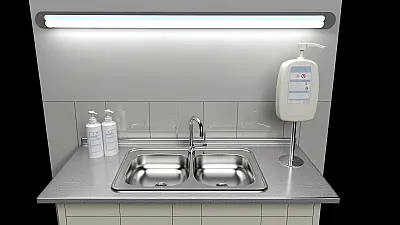NEW IBERIA, LA - State health inspectors cited Belle Teche Nursing & Rehabilitation Center for failing to maintain proper infection prevention protocols after finding a laundry worker handling contaminated linens without required protective equipment.

Infection Control Protocols Compromised
During an unannounced inspection on May 21, 2025, surveyors discovered significant gaps in the facility's infection control program when they observed improper handling of soiled laundry from resident rooms. The violation was classified as having minimal harm potential but affecting few residents, indicating a systemic issue that could have escalated without intervention.
State inspectors found a laundry staff member removing contaminated linens from a large collection barrel and loading them into washing machines while wearing only gloves. The worker was not wearing the required protective gown, despite handling materials that came directly from resident rooms and contained bodily fluids and other potentially infectious waste.
When questioned by inspectors, the laundry worker acknowledged she should have been wearing a protective gown during the sorting and loading process but had failed to do so. This admission highlighted both awareness of proper protocols and a breakdown in their implementation.
Medical Significance of Proper Laundry Protocols
Infection control in healthcare laundry operations serves as a critical barrier against disease transmission in nursing facilities. Soiled linens from resident rooms can harbor dangerous pathogens including antibiotic-resistant bacteria, viruses, and other infectious agents that pose serious health risks to vulnerable elderly populations.
The facility's own infection control policy, last reviewed in January 2025, specifically mandates that "soiled linens must be handled to contain and minimize aerosolization and exposure to any waste products." This requirement exists because improper handling can create airborne particles containing pathogens, potentially contaminating the surrounding environment and exposing staff to infectious diseases.
Healthcare laundry workers face elevated exposure risks when handling contaminated materials without complete personal protective equipment. The required gown provides essential protection against direct contact with infectious materials and prevents contamination of the worker's clothing, which could then spread pathogens throughout the facility.
Administrative Response and Oversight Gaps
The facility's administrator and registered nurse confirmed the violation when interviewed by state inspectors, acknowledging that proper protective equipment should have been worn during laundry operations. However, the administrator also noted that the facility's infection preventionist was not available during the inspection, raising questions about adequate oversight of critical safety protocols.
This absence of the infection preventionist during routine operations suggests potential gaps in supervisory coverage for infection control compliance. Federal regulations require nursing facilities to maintain consistent oversight of infection prevention programs, particularly for high-risk activities like handling contaminated laundry.
The administrator's confirmation that protocols were not followed indicates the facility recognizes proper procedures but has experienced failures in implementation and monitoring. This type of compliance breakdown can signal broader issues with staff training, supervision, or institutional culture regarding safety protocols.
Industry Standards and Best Practices
Healthcare facilities are required to maintain comprehensive infection control programs that protect both residents and staff from preventable disease transmission. The Occupational Safety and Health Administration (OSHA) and Centers for Disease Control and Prevention (CDC) have established clear guidelines for handling potentially infectious materials in healthcare settings.
Standard precautions for healthcare laundry operations require workers to wear appropriate PPE including gowns, gloves, and often respiratory protection when handling soiled linens. These protocols are designed to prevent both direct contact exposure and inhalation of contaminated particles that can become airborne during sorting and loading processes.
Facilities must also implement training programs ensuring all staff understand and consistently follow infection control procedures. Regular monitoring and supervision help identify compliance gaps before they result in actual exposures or regulatory violations.
Regulatory Implications and Facility Response
The citation falls under federal regulation F 0880, which requires nursing facilities to "provide and implement an infection prevention and control program." While classified as minimal harm, such violations can escalate quickly in healthcare environments where residents have compromised immune systems and underlying health conditions.
State survey agencies conduct these inspections to ensure facilities maintain safe environments for vulnerable populations. The facility must now develop and implement a plan of correction addressing the identified deficiencies and demonstrating measures to prevent future occurrences.
This inspection finding underscores the importance of consistent adherence to infection control protocols, particularly in areas like laundry operations that may receive less attention but remain critical for preventing healthcare-associated infections in long-term care facilities.
Full Inspection Report
The details above represent a summary of key findings. View the complete inspection report for Belle Teche Nursing & Rehabilitation Center from 2025-05-21 including all violations, facility responses, and corrective action plans.
💬 Join the Discussion
Comments are moderated. Please keep discussions respectful and relevant to nursing home care quality.